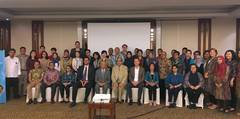Final Results Dissemination Workshop on Valorization of Evidence for Inclusive Education Policy
8 January 2018, Le Meridien Hotel, Jakarta
The Results Dissemination Workshop has brought together researchers, NGOs and policymakers to explore ways to improve the availability, accessibility, and usage of evidence for effective and inclusive education policy in the country towards the achievement of the Sustainable Development Goal 4.
Valorization of Evidence for Inclusive Social Development is a project designed by UNESCO’s MOST programme to provide capacity building to Member States in improving the uptake of evidence and research in policymaking processes related to the achievement of 2030 Agenda. Funded by the Malaysian government (Funds-in-Trust for UNESCO), the project has enabled the National Working Groups in Indonesia, Malaysia and the Philippines to produce stakeholder maps, situational analyses, and practical guidelines for valorization of research and evidence for inclusive policymaking as a way to ensure the realization of the 2030 Agenda and its inclusive social development goals in their countries.
Indonesia – the world’s fourth most populous country and third largest democracy – has taken important steps to turn the SDGs into reality by setting up SDG Secretariat and elaborating indicators that reflect national development priorities. One of these top priorities is to fulfill the Indonesians’ right to education. While the country has made impressive gains to ensure near universal education through the increase in the primary enrolment rates, challenges remain in secondary education and in terms of quality and social inclusion.
The SDG 4 of the 2030 Agenda is very ambitious: to ensure inclusive and equitable quality education for all by 2030. How can we be sure that we do not fall short of this important promise in Indonesia? A big part of the answer lies in the use of evidence in designing, implementing and monitoring policies in the area of education.
The intensive research and analytical efforts of this project in Indonesia led to the production of the Situational Analysis to identify the prevailing practices in using evidence for selected education policy areas, and the Practical Guidelines to improve these practices and to promote rational, rights-based, and evidence-informed decision-making. The Final Workshop will use this knowledge to enhance the capacity of professionals (academia, government, and civil society) and to strengthen the research-policy interface towards the implementation of the SDG 4.
Two researchers from Malaysia who have led a similar project in their country have joined the workshop in Jakarta to enrich the discussion from the cross-country perspective.
The capacity building materials produced through the Indonesian, as well as the Malaysian and the Philippines projects are available for global use through UNESCO’s Inclusive Policy Lab platform.
For the agenda of the workshop please click here.
For more information, please contact Mr. Irakli Khodeli i.khodeli(at)unesco.org
<- Back to: Dynamic Content Single View


